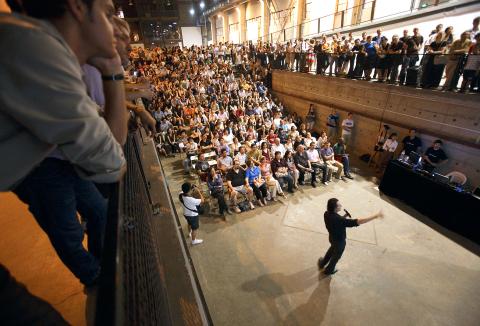Named after the Japanese word for “chit chat,” Pecha Kucha Night gives people from creative fields a forum in which to quickly talk about their work. The emphasis is on “quick”: during every presentation, 20 images are shown, each for just 20 seconds, while the speaker talks along to the slideshow.
Taipei’s edition of Pecha Kucha Night Vol. 19 features a dozen speakers and will take place at the Xue Xue Institute (學學文創展坊) in Neihu tomorrow evening. Pecha Kucha Night, which has taken place in nearly 500 cities around the world, was first created in Tokyo in 2003 to bring together young designers who wanted to introduce their work and ideas to the public in an informal and fun environment. Architects Astrid Klein and Mark Dytham, who hosted the first Pecha Kucha Night nine years ago, created the presentation format.
Tomorrow’s event will be followed by an afterparty. Speakers include: the creators of Yuan Soap (阿原肥皂), which makes toiletries using plants grown in Taiwan; Dizzy Ha (哈其昌), the creative director of Winzz (蔚思), one of Taiwan’s leading makers of iPhone and iPad apps; Urban Nomad Film Fest cofounder and curator David Frazier; Apple Computer products reseller Studio A’s senior instructor Lin Ching-che (林敬哲); Luke Foto Studio director and photographer Luke Huang (黃仁益); Joe Fang (方序中) of Sense30, which builds vintage-style bicycles; performance artist Yeh Yili (葉怡利); Hsu Chen-i (許晨一), the director of creative agency Reactive Creative; Izy Ye (葉如娟), artist and owner of the store Izy’s Home; and illustrator Sally Lin (林莎莉).

Photo: Bloomberg

Desperate dads meet in car parks to exchange packets; exhausted parents slip it into their kids’ drinks; families wait months for prescriptions buy it “off label.” But is it worth the risk? “The first time I gave him a gummy, I thought, ‘Oh my God, have I killed him?’ He just passed out in front of the TV. That never happens.” Jen remembers giving her son, David, six, melatonin to help him sleep. She got them from a friend, a pediatrician who gave them to her own child. “It was sort of hilarious. She had half a tub of gummies,

June 23 to June 29 After capturing the walled city of Hsinchu on June 22, 1895, the Japanese hoped to quickly push south and seize control of Taiwan’s entire west coast — but their advance was stalled for more than a month. Not only did local Hakka fighters continue to cause them headaches, resistance forces even attempted to retake the city three times. “We had planned to occupy Anping (Tainan) and Takao (Kaohsiung) as soon as possible, but ever since we took Hsinchu, nearby bandits proclaiming to be ‘righteous people’ (義民) have been destroying train tracks and electrical cables, and gathering in villages

The wide-screen spectacle of Formula One gets a gleaming, rip-roaring workout in Joseph Kosinski’s F1, a fine-tuned machine of a movie that, in its most riveting racing scenes, approaches a kind of high-speed splendor. Kosinski, who last endeavored to put moviegoers in the seat of a fighter jet in Top Gun: Maverick, has moved to the open cockpits of Formula One with much the same affection, if not outright need, for speed. A lot of the same team is back. Jerry Bruckheimer produces. Ehren Kruger, a co-writer on Maverick, takes sole credit here. Hans Zimmer, a co-composer previously, supplies the thumping

Swooping low over the banks of a Nile River tributary, an aid flight run by retired American military officers released a stream of food-stuffed sacks over a town emptied by fighting in South Sudan, a country wracked by conflict. Last week’s air drop was the latest in a controversial development — private contracting firms led by former US intelligence officers and military veterans delivering aid to some of the world’s deadliest conflict zones, in operations organized with governments that are combatants in the conflicts. The moves are roiling the global aid community, which warns of a more militarized, politicized and profit-seeking trend